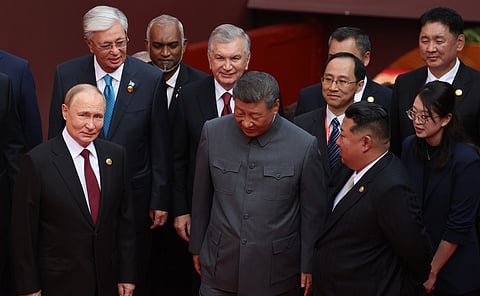

U.S. President Donald Trump voiced sharp criticism of a high-profile gathering of world leaders in Beijing on Wednesday, accusing them of “conspiring” against the United States as they attended a military parade commemorating the 80th anniversary of Japan’s surrender in World War II. The event brought together some of Washington’s most prominent geopolitical adversaries, underscoring shifting global alliances.
Posting on Truth Social, Trump questioned whether Chinese President Xi Jinping would acknowledge the U.S. role in supporting China during World War II, writing:
“The big question to be answered is whether or not President Xi of China will mention the massive amount of support and ‘blood’ that The United States of America gave to China in order to help it to secure its FREEDOM from a very unfriendly foreign invader… May President Xi and the wonderful people of China have a great and lasting day of celebration. Please give my warmest regards to Vladimir Putin, and Kim Jong Un, as you conspire against The United States of America.”
Speaking later alongside Polish President Karol Nawreicki, Trump described the parade as “very, very impressive” and acknowledged he believed its message was partly directed at him: “They were hoping I was watching, and I was watching,” he said.
The parade featured Chinese President Xi flanked by Russian President Vladimir Putin and North Korean leader Kim Jong Un, symbolizing a united front among key U.S. rivals. Iranian President Massoud Pezeshkian was also in attendance, reflecting Tehran’s strengthening ties with Beijing and Moscow following the 12-day war with Israel and U.S. strikes on Iran earlier this summer.
Trump has faced criticism domestically for his recent foreign policy moves, including the imposition of 50% tariffs on India over its purchase of Russian oil. Indian Prime Minister Narendra Modi attended the Shanghai Cooperation Organization (SCO) summit in China just days before the parade, meeting both Putin and Xi for the first time in seven years, a development seen as deepening the alignment of non-Western powers.
While Trump dismissed the parade as a symbolic gesture rather than a direct challenge, the event highlighted the growing cohesion among nations increasingly resistant to U.S. influence.